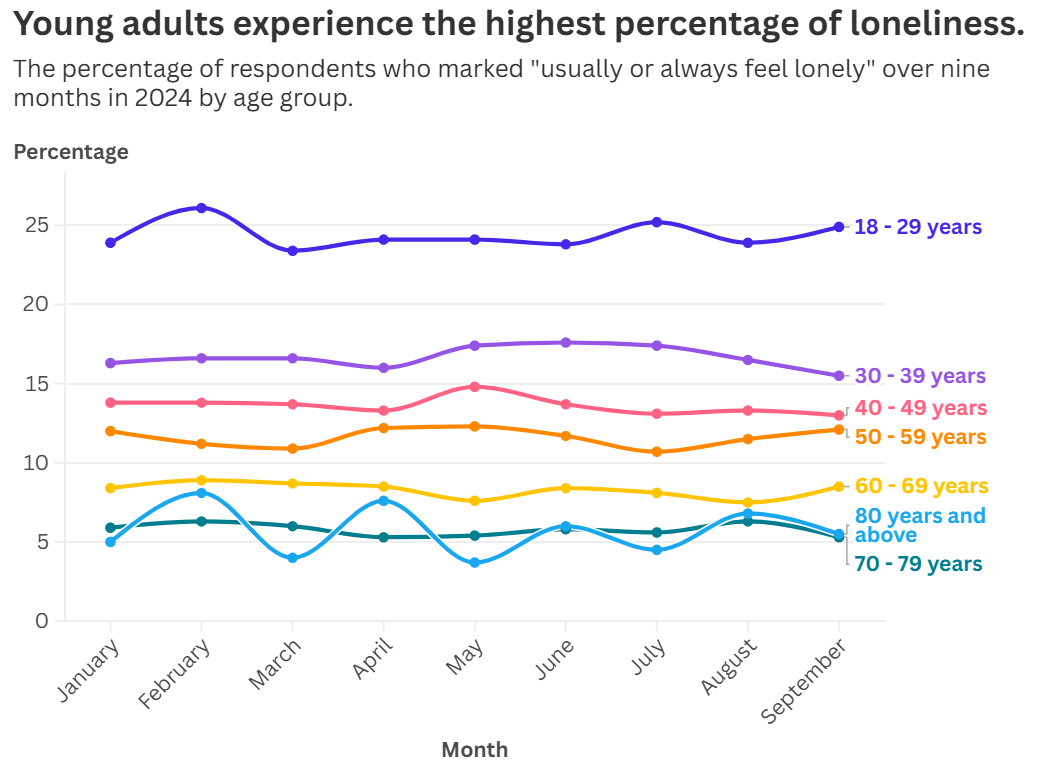
Content warning: description of sexual content and potential spoilers
A brief visit to the cinema and any viewer will be bombarded with regurgitated content. Perhaps it’s a continuation of a Marvel franchise or yet another movie caricaturing a video game marketed for young children. Maybe it’s a sequel to a trashy romance novel that no one asked for. Visionary films like Babygirl are becoming a rarity.
Released in theaters on Dec. 25, 2024, Babygirl is a radical meditation on cultural discourse about sex, power and the workplace, scorning a culture that forces women over the age of 40 to relinquish sexual pleasure.
The film spotlights a high-powered tech CEO Romy Mathis (Nicole Kidman), who becomes increasingly fatigued by monotonous sex with her uninspiring husband (Antonio Banderas). Despite her peaceful domestic life and love for her two adolescent daughters, she longs for an escape from mundanity. When she is unwillingly paired with company intern Samuel (Harris Dickinson), Romy finds herself matched with someone she’s not fully equipped to handle. Samuel, not predisposed to submit to authority, launches an incessant pursuit of Romy in a bid for power. Samuel’s dominance over Romy, despite his relative youth, reverses the dynamic between superior and subordinate as Romy buckles under his appeal.
During their first meeting, when Romy asks Samuel about how she wields power, he asserts: “I think you like to be told what to do.” At its conclusion, Samuel shuts the door and the intern and the CEO kiss. An affair ensues–complicated by Samuel’s stipulation that he orders Romy around, and she complies–otherwise he will disclose their affair to the company.
At a first-glance viewing, Romy’s submission to Samuel may seem regressive. Here is a powerful woman who worked her way to the top of male-dominated corporate hierarchy and is willing to put it all on the line for an affair with her twenties-something intern. Beyond this view, though, it is arguable that due to Romy knowing the risks of her sexual endeavors, engaging in this affair is an exercise in futility and a championing of her sexuality. She is also able to keep the affair under careful wraps for the majority of the film, a testament to her shrewdness.
Babygirl has been criticized online for its apparent lack of eroticism. According to one Substacker, “Halina Reijn’s third feature is dangerously light on eroticism and absent of any bodily suspense.” Moreover, many viewers were dismayed to find that the branding of “erotic thriller” that the film’s marketing team advertised did not match the milder quality of the film. While its review was generally positive, The New York Times criticized Romy’s narrow aspirations, writing, “[her] search for existential freedom proves disappointingly limited.”
I believe this view ultimately misreads Babygirl. The film never tries to approach pornography in the same way an erotic thriller like Saltburn attempted. The thrill of Babygirl lies in its suspense and sexual tension between the central characters (Samuel and Romy, Romy and her husband). One may also argue that Romy’s ability to achieve existential sexual freedom ultimately proves promising at the film’s conclusion.
Babygirl is supplemented by visionary cinematic gestures. Its haunting soundtrack, with ongoing pulsating overtones, concocts an erotic veneer. Close shots highlighting character’s mannerisms create an effective interiority.
Rife to stir the pot, Babygirl moves beyond one affair, interrogating an inverted culture of power at the company.
Romy and Samuel are one of two inappropriate dalliances occuring at Tensile. Samuel is also casually dating Esme (Sophie Wilde), Romy’s assistant and the supervisor of the internship program. Esme is outspoken in advocating for more female representation at the company, despite a fling with Samuel. On a second viewing, I was far more attuned to the improper nature of such a relationship. Shouldn’t Esme also be held to account for her behavior? Is Samuel a womanizer for playing power games with his bosses? Babygirl dramatically subverts norms of power and dominance, with two high-powered female supervisors at his beck and call.
No film I’ve seen so aggressively depicts sex and power like Babygirl. Though Romy relinquishes much of her agency to Samuel, the film unapologetically centers her interests. Babygirl’s scenes of ecstasy between Romy and Samuel are juxtaposed with tortured sex scenes between Romy and her husband, as their encounters become increasingly strained. Kidman’s ability to channel sexual frustration is remarkable as she fakes orgasms, imitates groans of pleasure, and screams with passion when she later watches BDSM pornography.
The presentation of power dynamics in Babygirl is so assertive and in-your-face that it laced me with a simmering disconcertedness. Samuel’s behavior throughout the film epitomizes reversals of power, dominance and submission. While Samuel’s actions are wildly inappropriate, Romy is perhaps more out-of-line as the highest-authority member of the company having an ongoing relationship with a member of the lowest authority.
Throughout the movie, the power structure between Romy and Samuel remains ambiguous. Does Samuel wield power over Romy since he can put an end to her career with one call? Does Romy have Samuel at her disposal through her sex appeal? The film’s refusal to answer these questions is its masterful design: the resolution lies in audience perception.
Babygirl also strongly upends norms of female empowerment. Reminiscent of the commentary on women’s aging presented in Oscar-contender The Substance, Babygirl advocates for middle-aged women’s right to sexual pleasure.
Though the film ultimately functions well independent of its actors, Babygirl would not have been the juggernaut that it became without career-defining performances from Kidman and Dickinson. Kidman is hardly a newcomer in playing women drawn to sexually dominant men. In Big Little Lies, she played a wife experiencing domestic abuse at the hands of her husband and was sexually drawn to his outbursts. But while Big Little Lies may have presented a regressive portrait of sexual desire, Kidman champions Romy’s urges in a way that is defiant and thought-provoking. Dickinson’s performance– channeling confidence in the extreme–is nothing short of Oscar-worthy and he quite-literally nails the image of dominance that Samuel radiates.
Despite its radical commentary on sex and astounding performances by Kidman and Dickinson, Babygirl was snubbed, in my not-very humble opinion, by the Academy, receiving zero Oscar nominations. A film that is as assertive as Babygirl is doomed to polarization, but it is regrettable that such a thought-provoking piece of cinema could be completely overlooked by the Academy.
Nonetheless, the film’s December release was met with towering success. Babygirl quickly recouped its $20 million budget, becoming a box office juggernaut and Nicole Kidman’s most successful movie in over two decades.
Whether or not the Academy approved, Babygirl is a film for the ages and is richly instructive on how future films can approach sex and power.



